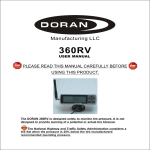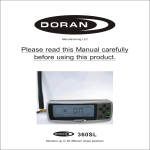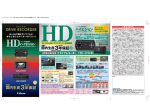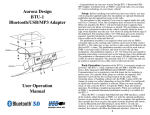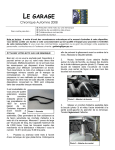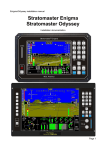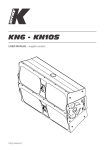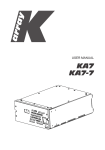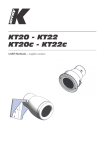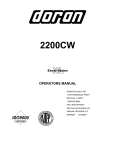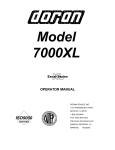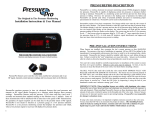Download User Manual - Doran Manufacturing
Transcript
Manufacturing LLC 360HD USER MANUAL Please read this Manual carefully before using this product. The DORAN 360HD is designed solely to monitor tire pressure. It is not designed to provide warning of a potential or actual tire blowout. The National Highway and Traffic Safety Administration considers a tire flat when the pressure is 25% below the tire manufacturers' recommended operating pressure. TABLE OF CONTENTS I. Introduction to the Doran 360HD-------------------------------------------------------------------------------------1 Components------------------------------------------------------------------------------------------------------------- 2 Glossary of Terms----------------------------------------------------------------------------------------------------- 2 II. Setup and Installation 1. Monitor Installation------------------------------------------------------------------------------------------------- 3 2. Programming the System---------------------------------------------------------------------------------------- 4 A. Programming the Sensor Location-------------------------------------------------------------------- 5 B. Baseline Pressure Programming---------------------------------------------------------------------- 7 C. Programming the Date & Time for Stored Alarm History--------------------------------------- 8 D. Programming the Unit of Measure------------------------------------------------------------------ 11 E. Delete Sensor Location-------------------------------------------------------------------------------- 12 F. High Pressure Alarm Programming----------------------------------------------------------------- 13 III. Installing the Sensor on the Vehicle----------------------------------------------------------------------------- 14 IV. Alarm Modes----------------------------------------------------------------------------------------------------------- 16 1. First Stage Alarm for 12.5% Low-----------------------------------------------------------------------------17 2. Second Stage Alarm for 25% Low--------------------------------------------------------------------------- 17 3. High Pressure Alarm---------------------------------------------------------------------------------------------18 4. Lost Sensor Alarm------------------------------------------------------------------------------------------------18 V. Normal Mode Accessory Functions 1. Drop and Hook Feature----------------------------------------------------------------------------------------- 19 2. System Reset Function----------------------------------------------------------------------------------------- 20 3. Stored Alarm Information--------------------------------------------------------------------------------------- 20 4. Backlight for Night Operations-------------------------------------------------------------------------------- 21 VI. FAQs and Tips 1. Frequently Asked Questions---------------------------------------------------------------------------------- 22 2. Tips------------------------------------------------------------------------------------------------------------------- 25 3. Limited Warranty--------------------------------------------------------------------------------------------------26 4. Specifications------------------------------------------------------------------------------------------------------ 28 VII. Optional Accessories------------------------------------------------------------------------------------------------29 I. INTRODUCTION The Doran 360HD is a full-time wireless electronic tire pressure monitoring system (TPMS) designed to monitor and display tire pressures from 10 psi up to 188 psi. It is capable of displaying current tire pressure on demand, whether moving or stationary. The 360HD is a monitoring system and will not prevent tires from losing pressure or failing. However, low pressure is the leading cause of premature tire failure and the 360HD can provide early notice of potential problems and assist in maintaining proper pressurization in vehicle tires. The 360HD can be used on all pneumatic tires. The 360HD consists of two basic components: tire sensors which screw onto the valve stems of tires, and a monitor. Sensors transmit a coded RF signal and alert if pressure drops. The monitor displays each tire's pressure and an audible alert if tire pressures drop. During an alert, the low tire location is displayed on the monitor, the monitor will display LOW PRESSURE , the current pressure reading for that tire flashes, and an audible alert sounds. The system can alert at 2 levels: The first alert occurs when pressures drop more that 12.5%. A second more urgent alert occurs if tire pressures drop more than 25%. As with many RF products, signal interruption can occur and prevent a signal to reach the monitor. When used properly, the Doran 360HD will inform the driver of the tire pressures on the vehicle so the operator has the opportunity to make any necessary adjustments to the air pressure before a serious problem occurs. Tires and valve stems should be inspected thoroughly prior to installation of the system to ensure they are in good condition and inflated properly. It is not uncommon to find valve stems that need replacing when installing the 360HD system. Doran recommends that rubber valve stems be replaced with metal stems. Some rubber stems have been found to be inferior and could fail prematurely. A visual inspection of tires on a regular basis is recommended. The 360HD does not prevent low tire pressure, it alerts when tire pressures are low, allowing action to be taken. A damaged sensor or valve stem can cause pressure loss. Inspect regularly. If repeated faults are observed, discontinue use of the system and contact Doran Mfg. at: 1-866-816-7233. The 360HD cannot prevent tire/wheel overload. Overloading any tire is extremely dangerous and can cause the failure of any suspension component, not just tires! The only way to detect overloading is to weigh the vehicle! A vehicle should never be operated if the weight on any wheel is greater than the design specification! Even a correctly inflated tire can fail if overloaded. 1 I. INTRODUCTION Tires can fail for other reasons besides low pressure or overloading. Always be on the alert for any other tire problems as indicated by unusual noises, vibrations, uneven tread wear, or bulges on the tire! If any of these symptoms occur, have the tires checked immediately by a professional! SYSTEM COMPONENTS: (1) Display Monitor w/ hard wire (1) Sensor for each tire position purchased (1) Visor clip/ fastener tape mounting kit (1) Nylon wire ties kit (1) Dill valve tester (1) Installation and Operation Manual If you are missing any of these components, DO NOT proceed with the installation. Contact the manufacturer for any missing or replacement parts. GLOSSARY OF TERMS: Normal Mode: When monitor is monitoring all programmed sensors and there are not any faults, the monitor will display a green light and the display will show ON . Alert Mode: When the monitor has received a signal that is outside of the parameters of the Normal Operation an alert will be displayed with icons describing the fault along with an audible beeping sound. Pressing the Set or Program buttons can turn off the audible alarm. Baseline Air Pressure: This is the pressure that is programmed into the monitor to identify what the pressure is to be in each tire position. The monitor will calculate all alarms from this setting. The baseline pressure should ALWAYS be set when tires are at ambient temperature. Ambient Temperature: This is the temperature of the outside air. Tires can heat up significantly which will change the pressure in a tire. If pressures in the tires are set when the tire temperature is elevated, it can cause the monitor to give alerts because when the tires cool the pressure will drop and sometimes this will fall 12.5% below the baseline pressure. RF: The term used to identify Radio Frequency signals. 2 II. SETUP AND INSTALLATION 1. Monitor Installation The 360HD gives the user multiple options for mounting the monitor for viewing. You have the option to place on the sun visor, attach to the windshield, fasten to the dash, attach using the pedestal mount, or the ability to use the hook and loop pads to fasten the monitor to a flat surface. If you are using the hook and loop pads, we suggest that the surfaces that you are applying the pads to be cleaned with alcohol to remove any grease or oils that could be present. Choose the monitor back panel which will work best for your application, remove the Figure 1-1 proper small breakaway tab (see Figure 1-1). A. In order to access the full benefits of the system you will need to hard wire the monitor to the vehicles' electrical system. You will see that there are three wires in the harness. Red is the 12-volt positive constant connection. This should be connected to a 12-volt power source that is always ON . The Blue wire will be the switched 12-volt positive connection. This wire should only be live when the key is in the ON position. The BLACK wire is to be connected to a good ground. This hookup will allow the monitor to receive signals when the vehicle is not running, and update the monitor in real time. When the key is turned on you will have the current information for your tire condition immediately before you begin your next trip. The monitor is fused internally, however some installers would still prefer to install an inline fuse for precautions. We suggest an optional 2-amp fast blow fuse be used for this purpose. B. The first time the monitor is powered up the display will show NSP . This is saying that there are No Sensors Programmed to the monitor. It could be that the sensors that were programmed to the monitor have not reported in to the monitor in order to lock the sensors into the memory. If this is the case it could take up to 6 minutes for this to happen. If this is the first time you have attempted to install the system and the sensors have not been programmed into the monitor, the system will need to be programmed per the following section. 3 II. SETUP AND INSTALLATION SET Used to lock in selections during programming. Used to turn on and off the backlight. (4) Arrow buttons are used to Navigate the screen and select values in the program mode PROG Used to enter the program modes. Also used to silence alarms. 2. Programming the Monitor For the monitor to function effortlessly, the user must install the correct data. The information input to the monitor will allow the monitor to recognize the sensors and wheel positions as well as the baseline pressures for all tires. This is done in the following steps. Do not install sensors until all programming is completed and you have returned to the normal operation mode. 4 II. SETUP AND INSTALLATION A. Programming the Sensor Location 1. Be sure that the power is on. The first time the monitor is switched on; the display should show NSP .This will signify that no sensor is programmed, or the monitor has not received a new sensor signal yet. If this is the case it could take up to 6 minutes for the sensor to report in if it is already attached to the valve stem. You will now need to enter into the programming mode if you need to add sensors to the monitor. If you are entering new sensors into the monitor be sure to leave the sensors off of the valve stems until the programming is complete. 2. Press and hold the PROG button for approximately 5 seconds, the monitor screen will automatically change over to the program mode, and then you can release the button. When you have entered this mode the monitor will display all of the tire positions and the word PROGRAM will be displayed (see Figure 2-1). As Figure 2-1 you will see by Figure 2-1 the monitor can be set up to display a motor home pulling a car or trailer, or a car / truck pulling a trailer. 3. Select a tire position using the arrow buttons and input the 3-digit serial number located on the sensor into the monitor (see Figure 2-2 for the three-digit number). The monitor will automatically capture the serial number and information when air pressure is supplied to the sensor for that wheel position and lock it into the monitor. Be sure to keep the sensors identified as to which wheel positions they belong so that you can attach the sensors to their proper location for future reference. Use the diagram in Figure 2-3 to record the 3 digit numbers onto the wheel locations that you will be selecting. Figure 2-3 5 Figure 2-2 II. SETUP AND INSTALLATION 4. Using the arrow keys select the first tire position that you want to program. The selected wheel location will be solid. The other wheel positions will only be an outline. If sensors have already been programmed to the monitor, the only sensor locations that will be displayed will be the ones that do not have a sensor already programmed to it. When you have selected the position that you want to program a sensor to, press the SET button for 3 seconds. This will cause the first dash (see Figure 2-4) of a three-digit sensor number to blink that will need to be entered. 5. Using the up and down arrow buttons, change the first digit to the first corresponding digit of the sensor ID number that you want to program. When you have selected the correct digit press the right arrow button to move to the next digit in the display. Figure 2-4 6. The center dash (-) of this digit will now blink (see Figure 2-5 ). Use the up and down button to change this digit to the number needed for the second digit of the sensor. When you have selected the correct number for the center section of this number press the right arrow button so the remaining dash (-) begins to flash of the three-digit number (see Figure 2-6). Figure 2-5 7. Adjust this position with the up and down button until you have the correct number displayed. Pressing the right or left arrow button will allow you to change one of the numbers that you have previously selected if needed. Figure 2-6 8. If you have the correct number displayed, press the SET button for 3 seconds until the number flashes twice and you hear a beep twice to signify that the sensor ID number was successfully input to the monitor ( see Figure 2-6a). 9. A new position will be highlighted to input another serial number. If you wish to program another sensor repeat the above steps in Section A. 6 Figure 2-6a II. SETUP AND INSTALLATION 10. Once you have completed the sensor programming sequence for all tires, press the PROG button momentarily to move to the next step, this will be the Base Line Pressure Programming. The monitor will display as shown in Figure 2-7. If you are completely done with all of the programming operations you can press the PROG button for 5 seconds and the monitor will return to the normal mode of operation. This can be done at the end of any section of the program mode when the programming is completed. B. Baseline Pressure Programming NOTE: To enter directly into this program mode you will need to press the PROG button for 5 seconds until the PROGRAM is displayed. Then press the PROG button again briefly to enter this mode (see Figure 2-7 for screen display). Figure 2-7 NOTE: To skip this section and go directly to Programming the Date and Time for Stored Alarm History Information just press the PROG button briefly 1 time. The display should look like Figure 2-10. Anytime during this mode you can escape out to the next program mode by pressing the PROG momentarily. The baseline pressure has been set in the factory at 100-psi for all wheel positions. We recommend that you set the baseline pressure at the same pressure as your recommended Manufacturers' Operating Tire Pressures for each vehicles tire being monitored. If you want to change the baseline pressure, or a new sensor is programmed, then follow the procedure below. The monitor should now be displaying the wheel positions available to program, the words PRESSURE, the unit of measure (PSI, Bar, or kPa) and PROGRAM will be displayed as well as the baseline pressure for the selected wheel position (see Figure 2-7). The positions that already have sensors programmed to the monitor will be highlighted at this time (see Figure 2-8). You can program the air pressure from 5 PSI to 188 PSI,depending on your needs. Each wheel position can be set with a different baseline air pressure if this is what is needed. The monitor has been pre-programmed for 100 PSI at 7 Figure 2-8 II. SETUP AND INSTALLATION each wheel position. If this is the baseline air pressure that you need then you will not have to do anything in this mode and can press the PROG button and go to the next step. If you need to change the baseline air pressure for a wheel position, continue with Steps 1-4 below: Figure 2-9 1. Using the same procedure as done previously, use the arrow buttons to select a wheel position and press the SET button for 3 seconds. This will cause the first dash or number to blink (see Figure 2-9) of a three-digit baseline pressure number that will need to be entered for the tire position selected. 2. The first digit of the three dashes will automatically start to flash. To adjust the air pressure for the first digit press the up or down arrow button to change the number. For a number less that 100 you will need to start your number with a 0. For the air pressure of 95 PSI your imputed number for the baseline pressure would be imputed as 095 . 3. Press the left or right arrow button to select the next digit. Use the up and down arrow buttons to change that digit. When you have entered the number that you want, press the SET button for 3 seconds until the number flashes twice and a double beep is heard to signify that the number has been locked into the monitor's memory. 4. A new position will be highlighted to input a baseline air pressure. If you wish to program another sensor repeat the steps 1 thru 3. If you have completed the sensor baseline air pressure programming sequence then you can press the PROG button momentarily to move to the Time and Date -stamp setting mode. If you are done with the programming operation you can press the PROG button for 5 seconds and the monitor will automatically return to the normal mode of operation. This can be done in any section of the program mode when the programming is completed. C. Programming the Date and Time for Stored Alarm History Information NOTE: To enter directly into this program mode you will need to press the PROG button for 5 seconds until the PROGRAM is displayed. Then press the PROG button again briefly 2 times to enter this mode (see Figure 2- 10 for screen display). Figure 2-10 8 II. SETUP AND INSTALLATION NOTE: To skip this section and go directly to the Programming the Unit of Measure section, just press the PROG button briefly 1 time. The display should look like Figure 2-17. Anytime during this mode you can escape out to the next program mode by pressing the PROG momentarily. 1. The first thing that you will adjust is the Year (Y). Pressing the SET button for 3 seconds will cause the center digit after the Y to flash (see Figure 2-11). This should remain a 0 until the year 2010, and then it will be changed to a 1. Pressing the up and down arrow buttons will adjust the value of this digit. When you have selected the number that you want, press the right button to adjust the right digit in the same manner with the up and down arrow buttons. When you have the proper number displayed for the year (Y) press and hold the SET button for 3 seconds until the monitor beeps twice and the display flashes twice. (The monitor will now display like Figure 2-12.) 2. To adjust the Month (M) you will need to press and hold the SET button until the center digit flashes. The months will be displayed as (01) for January thru (12) for December. Pressing the up and down arrow buttons will adjust the value of this digit. When you have selected the number that you want press the right button to adjust the right digit in the same manner with the up and down arrow buttons. When you have the proper number displayed for the Month (M) press and hold the SET button for 3 seconds until the monitor beeps twice and the display flashes twice. ( The monitor will now display like Figure 2-13.) 3. To adjust the day (d) you will need to press and hold the SET button until the center digit flashes. Pressing the up and down arrow buttons will adjust the value of this digit. When you have selected the number that you want press the right button to adjust the right digit in the same manner with the up and down arrow buttons. When you have the proper number displayed for the day (d) press and hold the 9 Figure 2-11 Figure 2-12 Figure 2-13 II. SETUP AND INSTALLATION SET button for 3 seconds until the monitor beeps twice and the display flashes twice. The display is shown like Figure 2-14. 4. To adjust the hour (h) you will need to press and hold the SET button until the center digit flashes. Keep in mind that the hour will be displayed as a 24hour clock. An example is that 3:00 in the afternoon will be shown on the clock as h15. Pressing the up and down arrow buttons will adjust the value of this digit. When you have selected the number that you want press the right button to adjust the right digit in the same manner with the up and down arrow buttons. When you have the proper number displayed for the hour (h) press and hold the SET button for 3 seconds until the monitor beeps twice and the display flashes twice. The monitor will now display like Figure 2-15). 5. To adjust the minute (M) you will need to press and hold the SET button until the center digit flashes. You will notice that the Month and Minute both use the (M). Pressing the up and down arrow buttons will adjust the value of this digit. When you have selected the number that you want, press the right button to adjust the right digit in the same manner with the up and down arrow buttons. When you have the proper number displayed for the Minute (M) press and hold the SET button for 3 seconds until the monitor beeps and the display flashes twice. (The monitor will now display like Figure 2-16). 6. This will have brought you back to the (Y) years setting. Press the PROG button momentarily to move to the Pressure Units Programming Mode (see Figure 2-17). If you are done with the programming operation you can press the PROG button for 5 seconds and the monitor will automatically return to the normal mode of operation. This can be done in any section of the program mode when the programming is completed. 10 Figure 2-14 Figure 2-15 Figure 2-16 II. SETUP AND INSTALLATION D. Programming the Unit of Measure NOTE: To enter directly into this program mode you will need to press the PROG button for 5 seconds until the PROGRAM is displayed. Then press the PROG button again briefly 3 times to enter this mode (see Figure 2-17 for screen display). Figure 2-17 NOTE: To skip this section and go directly to the Sensor Deletion mode just press the PROG button briefly 1 time. The display should look like Figure 2-20. Anytime during this mode you can escape out to the next program mode by pressing the PROG momentarily. The next step in the programming mode is to select the unit of measure for the air pressure. The monitor is set from the factory to read in PSI (pounds per square inch) this is the default unit of measure. The monitor is also capable of displaying the air pressure in BAR and kPa (see Figure 2-18 and 19). If you want the monitor to read in PSI then nothing needs to be done except to press the PROG button to move into the next section of the programming mode. To change the units of measure do the following: 1. Press the left or right arrow to select the words PSI, BAR, or Kpa. 2. When you have your selection press the SET button for three seconds and the selection should blink twice and the beeper should beep twice to confirm the selection in the monitors' memory. 3. Press the PROG button to exit this mode and enter into the Delete Sensor Location mode next. If you are done with the programming operation you can press the PROG button for 5 seconds and the monitor will return to the normal mode of operation. This can be done in any section of the program mode when the programming is completed. 11 Figure 2-18 Figure 2-19 II. SETUP AND INSTALLATION E. Delete Sensor Location This step is only used when a sensor is to be removed from the memory of the monitor. This would be used to remove a sensor from one position and locate it to a different location, or to remove a sensor. If deleting a sensor is not necessary at this time, please see the second note below: NOTE: To enter directly into this program mode you will need to press the PROG button for 5 seconds until the PROGRAM is displayed. Then press the PROG button again briefly 4 times to enter this mode (see Figure 2-20 for screen display). Figure 2-20 NOTE: To skip this section and go directly to the High Pressure Alarm Programming mode just press the PROG button briefly 1 time. The display should look like Figure 2-23 or 2-24. Anytime during this mode you can escape out to the next program mode by pressing the PROG momentarily. If you want to return to the normal operation mode press and hold the PROG button for 5 seconds. The monitor will display the available sensors to delete and the words PROGRAM and DELETE will be displayed on the screen (see Figure 2-20). If a sensor does not need to be deleted you can just press the PROG button to go into the final program mode. If a sensor will need to be deleted you will need to do the following steps: 1. Using the arrow keys select the desired sensor that need to be deleted. The monitor will only display the wheel positions that have a sensor programmed to that position. When you select a position the threedigit number that was programmed will be displayed so you will be able to verify that this is the correct serial number to delete (see Figure 2-21). 2. When you have selected the location press and hold the SET button for three seconds. The threedigit number will flash twice and the beeper will beep twice to confirm that this position has been deleted. A different position will be displayed and the tire location that was deleted will now be gone (see Figure 2-22). 12 Figure 2-21 Figure 2-22 II. SETUP AND INSTALLATION 3. If you have additional sensors that need to be deleted repeat the steps until all required sensors are deleted. If you need to program deleted sensors to a different location, or add new sensors to the monitor's memory simply press the PROG button twice to enter into the Programming Sensor Location mode (see page 7). 4. When you are finished press the PROG button to enter into the HIGH PRESSURE program mode, which is the last item to program. If you are done with the programming operation you can press the PROG button for 5 seconds and the monitor will return to the normal mode of operation. This can be done in any section of the program mode when the programming is completed. F. High Pressure Alarm Programming NOTE: To enter directly into this program mode you will need to press the PROG button for 5 seconds until the PROGRAM is displayed. Then press the PROG button again briefly 5 times to enter this mode (see Figure 2-23 for screen display). Figure 2-23 NOTE: To exit this mode press the PROG button for 3 seconds to return to normal operation mode. The HIGH PRESSURE PROGRAM mode will allow you to set up your monitor to alarm if a pressure that is 25% higher than the baseline pressure is detected. This feature can assist in the checking of elevated heat in the tire. Pressures increase with elevated temperature. The monitor will display HIGH, PRESSURE, and PROGRAM and the center of the screen will display ON or OFF (see Figure 2-23 and 2-24). To turn on or off this feature do the following: 1. Using the left and right arrow buttons you will be able to turn this feature on and off as it is shown in the center of the display. 2. When your selection has been made, the SET button will need to be pressed for three seconds to lock the selection into the memory of the monitor. 13 Figure 2-24 II. SETUP AND INSTALLATION 3. Pressing the PROG button briefly will rotate you back through the different programming modes. If you are done with the programming operation you can press the PROG button for 3 seconds and the monitor will automatically return to the normal operation mode. This can be done in any section of the program mode when the programming is completed. III. INSTALLING THE SENSORS ON THE VEHICLE The monitor should now be turned on and it should be in the normal operation mode. It could take up to six (6) minutes for the monitor to receive the updated signal from the sensors once the monitor has been activated if the monitor was powered down. Be sure to inspect and replace any defective or cracked valve stems before installing the sensors. If replacements are necessary we suggest replacing the valve stems with a metal stem. It does improve the life of the stem due to premature failure from drying out and cracking. Inferior stems have been found in the market and can cause extensive damage. The dill valve at each tire position should now be checked to see if it is in the proper position to allow the sensors to be activated by the air pressure from the tires. This can be done using the enclosed Dill Pin Gauge (see Figure 3-1). When the gauge is used it should depress the dill pin enough to allow air to escape the valve stem (see Figure 3-2). If air does not escape from the valve stem, then you must use a Valve stem tool to adjust the dill pin out far enough to allow the dill pin tool to release air from the valve stem. This should not be necessary with the Doran 360HD. The dill pin should not be extracted to the point that air is released all the time from the valve stem. This should be checked with a bit of soapy water if you do make an adjustment to the dill valve and after the sensors have been installed. Figure 3-1 Dill Pin Figure 3-2 14 III. INSTALLING THE SENSORS ON THE VEHICLE Keep in mind that tire pressures will increase as you drive. When tires are in motion, the sidewalls are under stress carrying the load of the vehicle. This energy created by the tires develops heat, which causes the air in the tires to expand. This can cause air pressure to increase as much as 10 psi in Figure 3-3 certain applications. This is normal, and the manufacturers' recommended cold running pressures have already taken this into consideration. Always adjust air pressure when tires are cold or ambient to the baseline pressures that were programmed into the monitor for each wheel position. Cool temperatures and high altitudes can cause tires to lose pressure. If a tire is close to its low-pressure level, an alert can be sounded when pressure drops overnight due to cooler temperatures. Inflate to proper level in the morning. If sensors have not been programmed to the monitor, or signals received by the monitor after first installed the screen will display NSP (see Figure 3-3). 1. If the sensors have been programmed to the monitor you will now need to install the sensors onto the proper wheel positions on the vehicle. The sensor should be tightened only by hand, not with a tool. Use a firm grip and tighten the sensor. Check for leaks with a soapy solution. The monitor will begin to receive and recognize the sensors, and it will display the wheel positions as they are received on the screen. 2. When all the sensors that have been programmed to the monitor are received and within the baseline air pressure parameters, the display will show all the wheel positions that were programmed, the word ON will be displayed, on the screen, Figure 3-4 and the green LED light will come on (see Figure 34). You are now ready to enjoy the safety and comfort of your new Doran 360HD Tire Pressure Monitor System. 3. If any of the wheel positions are not within the baseline air pressures an alert will be issued by the monitor and the air pressure reading will be shown for the affected tire position and the monitor will show PRESSURE and whether it is a LOW or HIGH warning. The audible alarm will be heard (see Section IV for further details about alarms). 15 III. INSTALLING THE SENSORS ON THE VEHICLE 4. If the monitor continues to search for a sensor after 10 minutes it is possible that the sensor may not be programmed properly. Higher radio frequency (RF) transmissions travel mostly via straight lines and along line-of-sight pathways. The 360HD sensors are required to accomplish the difficult task of transmitting a low power FCC approved signal from vehicles' tires to the monitor. If a sensor fails to be recognized, move the monitor slightly. The vehicle could be in what is known as a Dead Zone this is where the signal is not able to travel because of its surroundings (pole barn siding, metal fence, side of a building). Moving the vehicle just a few feet can sometimes overcome this problem. The sensor will need to be removed and re-installed to activate the sensor for it to report quickly to the monitor. If you are using an optional signal booster kit, reposition the booster for a possible better reception. IV. ALARM MODES NOTE: An alert indicates that you are operating your vehicle in a dangerous condition. When the low pressure light illuminates, STOP and check your tire(s) as soon as safely possible, and inflate them to the proper pressure. NOTE: The DORAN 360HD will illuminate a flashing low tire pressure warning light and an audible alarm for three minutes when the inflation pressure in one or both tires is equal to or less than 12.5 % below the programmed baseline air pressure. The warning will continue to illuminate as long as the malfunction exists, whenever the monitor is switched on. The Doran 360HD has five types of alarm modes. The warning levels are: 12.5% below the programmed baseline air pressure for the first low-level alarm. The next alarm level is 25% below the programmed baseline air pressure. There is also a FAST LEAK warning when 2.8 PSI is lost from the tire in less than 12 seconds. The optional HIGH PRESSURE warning can be selected when you program the monitor. This alarm will react when the air pressure increases 25% above the programmed baseline air pressure. A LOST SENSOR alarm when the monitor does not receive the RF signal from the sensor. 16 IV. ALARM MODES 1. FIRST STAGE ALARM FOR 12.5% LOW AIR PRESSURE: On a first level low pressure alarm the monitor will alarm at 12.5% below the programmed base line air pressure. When this happens the backlight on the monitor screen will light up. The green LED light will go out, the Red warning light will begin to flash and the audible beeper will cycle at 1 flash or beep per second, the alarmed wheel position will be displayed. The pressure of the low tire, and the words LOW PRESSURE will be displayed on the monitor (see Figure 4-1). Pressing any of the buttons or after 100 seconds the audible alarm will be silenced. The monitor will continue to display the wheel position, air pressure of the alarmed wheel position and the words LOW PRESSURE until the problem is corrected. If the alarm comes on and the FAST LEAK icon appears (see Figure 4-2), this means the tire is loosing air at a rate faster than 2.8 PSI in a 12 second period. The FAST LEAK icon will only be displayed during the fast leak and will go out after 18 seconds when the air quits leaking from the tire. We suggest that the tire be inspected immediately. 2. Figure 4-1 Figure 4-2 SECOND STAGE ALARM for 25% LOW AIR PRESSURE: On a level 2 Low Pressure Alarm the monitor will alarm when the pressure has reached 25% below the programmed baseline air pressure. The National Highway and Traffic Safety Administration considers a tire flat when the pressure is 25% below the tire manufacturers' recommended operating pressure. When this happens the backlight on the monitor screen will light up. The green LED light will go out, the red warning light will begin to flash and the audible beeper will cycle at 2 flashes or beeps per second, the alarmed wheel position will be shown, the pressure of the low tire, and the words LOW PRESSURE will be displayed on the monitor similar to Figure 4-1. The screen will display the same information as a Low Pressure Level 1 Alarm. Pressing any of the buttons or after 100 seconds the audible alarm will be silenced. The monitor will continue to display the wheel position, air pressure of the alarmed wheel position and 17 IV. ALARM MODES the words LOW PRESSURE until the problem is corrected. If the alarm comes on and the FAST LEAK icon appears (see figure 4-2), this means the tire is loosing air at a rate faster than 2.8 PSI in a 12 second period. The FAST LEAK icon will only be displayed when a fast leak is detected and will go out after 18 seconds when the air quits leaking from the tire. We strongly urge you to pull over and inspect the possible tire damage immediately. When the low pressure light illuminates, STOP and check your tire(s) as soon as safely possible, and inflate them to the proper pressure. Driving on a significantly under-inflated tire can cause the tire to overheat and lead to tire failure. Under-inflation also reduces fuel efficiency and tires tread life, and may affect the vehicles' handling and stopping ability. 3. High Pressure Alarm: The Doran 360HD monitor is capable of monitoring for a High Pressure Warning. This is a warning that is displayed when the baseline air pressure is exceeded by 25%. When this happens the Green light will go out. The audible beeper will beep once per second and HIGH PRESSURE will be displayed on the monitor screen. This can be caused by extreme heat generated into the tire. When the High-Pressure warning appears, STOP and check your tire(s) as soon as safely possible, and check for the possible cause. This can happen because of a dragging brake, bad wheel bearing, extreme temperature conditions, or other mechanical failures that you might not detect. It is suggested that you check the suspect tire position for a possible mechanical failure. 4. Lost Sensor Alarm: The Doran 360HD monitor is capable of monitoring for a lost sensor signal (see Figure 4-3). If the monitor is unable to receive a signal from a sensor for more than 18 minutes an alarm will be displayed for that sensor. This does not mean that the sensor is missing, just Figure 4-3 that a signal was not able to get to the monitor. This could be from other signals interfering with the sensor signal, interference from structures, or a poor signal. By FCC rules we must allow signals from other sources to interfere with our signals. The Doran 360 series sensors, as well as all the other TMPS systems on the market are not allowed to interfere with other radio frequency (RF) signals. 18 V. NORMAL MODE ACCESSORY FUNCTIONS 1. Drop and Hook Feature This feature allows the operator of the vehicle to drop the monitoring of either the front or the rear vehicle allowing the monitor to only receive the RF signals from the vehicle that is in close proximity to the monitor. The operator can drop the trailer and still monitor the car or truck when trips are required without the trailer. The operator of an HD can drop the tow car if it is not required. The process is as follows: 1. Press the front and rear arrow buttons together for 3 seconds. 2. All of the programmed wheel positions will be flashing ( see Figure 5-1). 3. Press the front or rear button to select the front, back or both sections for the system to monitor. The section that is not selected will drop from the screen (see Figure 5-2 and 5-3). Figure 5-1 4. When your selection is made press both the front and rear arrow buttons for 5 seconds and this will lock your selection into the monitor. You will be able to monitor the selected wheel positions as you did when the system was fully operational. The monitor will go into the normal operation mode displaying ON and the green light will be on if the signals have been received and they are with-in the baseline air pressure ranges. Figure 5-2 5. To change or return to the fully operational monitor method repeat the previous instructions in this section. When you change or add a section to the monitor it can take up to 6 minutes for the monitor to capture all of the signals that were not previously being monitored. The monitor will return to the normal mode when all selected sensors have reported in and there are no faults. 19 Figure 5-3 V. NORMAL MODE ACCESSORY FUNCTIONS 2. System Reset Function The monitor can be reset to the factory defaults in one easy step. This will erase all of the serial numbers from the memory of the monitor and will then need to be re-programmed in order for the monitor to read the sensor signals. Be sure this is what you want to do before you proceed. Press and hold the PROG button for 30 seconds. This will erase all sensor information and return the monitor to its factory defaults. 3. Stored Alarm Information The Doran 360HD has the ability to store the last 10 alarm faults that have occurred. They cannot be erased; they can only be replaced by newer, more recent alarms. This can be useful if a history of alarms is necessary. It is unlikely that the typical RV enthusiast will require this feature. Monitoring the faults and when they occur can be a useful tool for the over the road trucking industry. To enter this function, press the PROG and SET buttons together for 3 seconds. A number 1 will be displayed on the screen (see Figure 6-1). If no other buttons are pressed within 1 second the monitor will automatically start to show the last alarm and then will show up to the last ten alarms that have occurred from the most recent to the oldest. If you press the SET button as soon as you enter this mode you can select the alarm of your choosing by using the left and right arrow buttons to select a fault number. Each fault display will last 3 seconds and then there will be a ½ second pause between each display until the SET button is pressed to display the next alarm. Figure 6-1 Figure 6-2 Figure 6-3 Figure 6-4 20 V. NORMAL MODE ACCESSORY FUNCTIONS The display will show as follows: Figure 6-2 Actual pressure for the alarm Figure 6-3 d07 is for the 7th month or July. Figure 6-4 d04 is for the 4th day of the month Figure 6-5 Figure 6-5 d06 is for the year 2006 Figure 6-6 A02 stands for AM and 2:00 Figure 6-7 M33 Stands for 33 minutes Figure 6-6 Figure 6-7 When you have finished checking the alarm history the PROG and SET buttons can be pressed together for three seconds to return to the normal operation mode. 4. Backlight on for night operation The backlight will automatically come on for any alarm or if you are viewing the wheel positions in the normal operation mode. The light does not remain on in the normal operation mode when ON is being displayed. To turn on the Backlight press the SET button in normal mode and press it again to turn the backlight off. 21 VI. FAQS AND TIPS 1. FREQUENTLY ASKED QUESTIONS DOES THE MONITOR NEED TO BE POWERED BY A LIGHTER ACCESSORY? No. In fact you will loose some of the benefits of the 360HD if the monitor is wired in this method. If a hard wire option is utilized the end user then will benefit from the sleep mode option that the system incorporates. This will allow alarms to be received by the monitor but will not allow the monitor to display them or allow the audible alarm to sound until the ignition switch is turned to the ON position. This way the people are not disturbed during an inconvenient time, but does allow for the alarm to be received before the vehicle is moved. WHY DID I FAIL TO GET A SIGNAL FROM A SENSOR DURING INSTALLATION? Higher radio frequency (RF) transmissions travel mostly via straight lines and along line-of-sight pathways. The 360HD sensors are required to accomplish the difficult task of transmitting a low power FCC approved signal from vehicles' tires to the monitor. If a sensor fails to be recognized, move the monitor slightly. The vehicle could be in what is known as a Dead Zone this is where the signal is not able to travel because of its surroundings (pole barn siding, metal fence, side of a building). Moving the vehicle just a few feet can sometimes overcome this problem. The sensor will need to be removed and re-installed to activate the sensor for it to report quickly to the monitor. If you are using an optional signal booster kit, reposition the booster for a possible better reception. WHY DOESN'T MY MONITOR TURN ON? If the monitor only turns on when the vehicle is running, a switched cigarette lighter receptacle is powering it. A red LED will light on the plug when it receives power. Check fuse in the end of the lighter accessory plug and if needed, replace with a 2 amp fast-blow fuse. If you have hard wired the system to the vehicle, be sure the ignition switch is on and check to see if either of the fuses that were installed inline has blown. Replace all fuses with a 2-amp slow-blow fuse. HOW DO I MUTE THE AUDIBLE ALERT? Press any button after the alert sounds. This will put the alert in the Quiet Mode. The green light will have turned off, the alert will be displayed on the screen, and the backlight will be lit. This will continue until the alarm has been corrected. WHAT IF THE GREEN LIGHT ON MONITOR DOES NOT LIGHT? If the green light on monitor does not come on it will signify that something is not correct with the settings that were input during setup to the monitor. Review the information on the display and if a proper air pressure is being displayed be sure that the baseline for the displayed wheel position was entered correctly. 22 VI. FAQS AND TIPS CAN THE MONITOR BE USED INDEPENDENTLY ON FRONT OR TOW VEHICLE? Yes see Drop and Hook Instruction PAGE 19. CAN I STORE MY VEHICLE LONG TERM WITH THE MONITOR ON? The monitor draws 60mA to 125 mA of power when it is under power and fully functional. The monitor could drain vehicle's battery over an extended period of time. Hooking the monitor up to enable the sleep mode will drastically reduce the power consumption over a long period. If storing for over 3 months, you might consider unplugging the monitor and removing the sensors for storage. (TIP: Clean egg cartons or plastic bags work well for storing the sensors.) Each Sensor has it's own serial number laser etched into the cover. Be sure to enter these ID numbers in the diagram on page 5 so sensors can be replaced on the same tire location when re-installing them, eliminating the need for reprogramming. If a low-pressure alert is given while in storage, the sensor will alert until the pressure is corrected and could dramatically affect the battery life of the sensors. Sensor will shut down and stop transmitting when less than 5 lbs of air pressure are present. When putting system back on, power monitor first, and then screw sensors onto their original wheel locations. Pressure reading will display within a few minutes on the monitor. Your 360HD system will now be active. HOW DO I CHECK THE TIRE PRESSURES? The pressures are updated to the 360HD Monitor every 6 minutes under normal circumstances. With the monitor in Normal Mode, press the SET button and then press the arrow buttons in order to select a tire's current pressure to display. When you have finished your inspection simply press the set button again to return the monitor to the normal mode. WHAT HAPPENS WHEN I REMOVE THE SENSORS TO INFLATE OR CHECK THE PRESSURE IN MY TIRES? It is recommended that tire pressures be checked regularly using a quality pressure gauge when the tires are at ambient temperatures. Remove the sensor, check pressure, and inflate if necessary. When you return the sensor to the valve stem, the sensor will begin to read the current pressure and return to its normal operation. With the 360HD system you can air up a low tire with the tire being warm and replace the sensor without worrying about the sensor giving a false alarm, like some of the other systems available on the market. 23 VI. FAQS AND TIPS HOW DO I DELETE A SENSOR? See page 12 for full details on sensor deletion. WHAT SHOULD BE DONE IF A LOW PRESSURE ALERT IS SOUNDED? Immediately pull over and check low tire. Physically check tire and repair. Be sure to check valve stem for damage. Soap stem to identify any leaks. WHAT MAKES MY SYSTEM SENSORS TRANSMIT? Sensors will transmit data to the monitor under the following conditions: 1. Sensors update with a signal every 6 minutes. 2. Sensors transmit any change of pressure recognized from the static pressure. WHAT CAUSES THE MONITOR TO DISPLAY ALARMS? 1. Air pressure has dropped 12.5% of your baseline tire pressure. This alert will continuously transmit once per second until low pressure is corrected or a button is pressed to place Monitor in Quiet Mode. 2. Air pressure has dropped to the second alert level, 25% under your programmed pressures. Alert will transmit twice per second. If a button is not pressed, unit will alert until pressure is corrected or up to 15 hours. 3. A sensor is removed from its tire. 4. Air pressure is released from the tire at a rate faster than 2.8 psi in less than 12 seconds. This will initiate a fast leak alert. DO I NEED TO REBALANCE MY TIRES WHEN USING A SENSOR? The 2/3 oz. sensor on a typical RV or large truck will not normally necessitate rebalancing tires. Smaller tires may require rebalancing. WHAT SHOULD I DO IF A SENSOR IS LOST OR DAMAGED? If a sensor is lost or damaged and needs replacing, call Doran Mfg. LLC toll free at 1-866-8167233 to order a new sensor. 24 VI. FAQS AND TIPS MY SENSOR WAS BLOWN OFF, (BLOWOUT) WITH NO ALERT GIVEN, WHY? Instant tire failure is rare in comparison to the more common failure caused by gradual tire deflation. It is possible, during an instantaneous blowout, to have the sensor blown off the tire before it has had a chance to send a signal to the monitor. The 360HD is not designed for this type of tire failure. Tire failure referred to as a blowout, is commonly due to low tire pressure resulting in an overheating of the tire sidewalls to the point of disintegration. The DORAN 360HD is designed solely to monitor tire pressure. It is not designed to provide warning of a potential or actual tire blowout. 2. TIPS TIRE CONDITION: Conduct a regular visual inspection of the vehicles tires. The sensors are not a substitute for proper tire maintenance and it is the user's responsibility to maintain proper amounts of tire pressure and respond accordingly to warnings and alerts. Low tire pressure is not the only problem associated with tires. Therefore, symptoms such as bulges, uneven tread, abnormal noise, etc. should immediately be brought to the attention of a professional. ROTATING/REPLACING TIRES: When rotating or replacing tires, mark wheel location of each sensor. Remove sensors and store in bags or in an egg carton until work is done, and then return the sensors to their original wheel location. You can also delete the sensor positions on the Monitor (page 12), and reinstall the sensors per the instructions on page 5. RF (Radio Frequency) PRODUCTS: The Doran 360HD utilizes RF technology to transmit a signal between the sensor and the monitor. RF signals are subject to interference from many types of signals and products, which can cause errors in the operation of the product. As with cell phones and other types of electronics using RF signals, signal interruption can occur and cause a lost signal transmission. REMOTE ANTENNA or INTERIOR / EXTERIOR BOOSTER FOR UNIQUE APPLICATIONS: Due to the unique features of RF signals and the construction and interference from electronics on some RVs and Trucks, a coaxial antenna or RF Booster may be necessary. If needed, contact Doran Mfg., LLC at: 1-866-816-7233. COOL TEMPERATURES AND HIGH ALTITUDE: These conditions may cause tires to lose pressure. If a tire is close to its low-pressure level, an alert can be sounded when pressure drops overnight due to cooler temperatures. Inflate to proper level in the morning. 25 VI. FAQS AND TIPS 3. LIMITED WARRANTY ONE YEAR LIMITED WARRANTY: Subject to the limitations and exclusions set forth in this Limited Warranty, the DORAN 360HD is warranted against defects in material or workmanship that result in a product failure under normal use during the one-year period following the date of purchase by the original end-user. This Limited Warranty applies only to claims made by the original end-user and cannot be assigned, transferred or conveyed to any subsequent users. The exclusive remedy for any product determined by DORAN Mfg. LLC to be defective within such period shall, at the sole option of DORAN Mfg. LLC, be the repair or replacement of such defective product, or the refund of the purchase price therefore. No other remedy shall be available. EXCLUSIONS FROM COVERAGE: This Limited Warranty does not apply to any claims arising from misuse, abuse, unauthorized repair or alteration, circumstances where the DORAN 360HD is improperly installed or improperly wired contrary to the DORAN 360HD product instructions; or damage or defect attributable to fire or other casualty, including, without limitation, acts of God or exposure to abrasive or corrosive materials or pollutants, or attributable to collision or other accidents involving motorcycles upon which the DORAN 360HD is installed. LIMITATIONS: THIS LIMITED WARRANTY IS EXPRESSLY IN LIEU OF ALL OTHER EXPRESS OR IMPLIED WARRANTIES, INCLUDING WITHOUT LIMITATION, THE IMPLIED WARRANTY OF MERCHANTABILITY AND THE IMPLIED WARRANTY OF FITNESS FOR A PARTICULAR PURPOSE, AND ALL OF ALL OTHER OBLIGATIONS OR LIABILITIES ON THE PART OF DORAN MFG. LLC. THIS LIMITED WARRANTY SPECIFICALLY EXCLUDES ALL INCIDENTAL, SPECIAL, OR CONSEQUENTIAL DAMAGES. IN NO EVENT, AND FOR NO CAUSE WHATSOEVER, SHALL DORAN MFG. LLC HAVE ANY LIABILITY TO ANY PARTY IN EXCESS OF THE ORIGINAL PURCHASE PRICE OF THE PRODUCT IN QUESTION. EXCLUSIVE AGREEMENT: This Limited Warranty is a complete and exclusive statement of the warranties which apply to the DORAN 360HD. There are no express or implied warranties beyond those expressly stated above. No employee, agent, dealer or other person is authorized to give any warranties on behalf of DORAN Mfg. LLC, except as authorized in writing. STATUTE OF LIMITATIONS: In purchasing the DORAN 360HD you agree that any action for breach of contract or warranty must be commenced within one year after the cause of action has accrued. 26 VI. FAQS AND TIPS PROCEDURE: Products determined to be defective within the terms of this Limited Warranty should be returned to Doran Mfg. LLC, transportation prepaid. Call DORAN Mfg. LLC for return authorization. No unauthorized returns shall be accepted. Sender is responsible for all costs incurred in the removal or reinstallation and shipping of the returned product. A copy of the sales slip from the point of purchase must accompany the returned product. APPLICABLE LAW: The internal laws of the State of Ohio, U.S.A. shall govern this Limited Warranty, and the exclusive venue for any dispute in connection with the purchase or use of the product shall be the state and federal courts of general jurisdiction located in Hamilton County, Ohio U.S.A. SPECIAL NOTICE TO CONSUMERS: If you have purchased this product for person, family or household use: (1) Some states do not permit disclaimers or term limitations of implied warranties so that the disclaimers and limitations in this Limited Warranty may not apply to you; (2) Some states do not permit the exclusion or limitation of incidental or consequential damages so that the exclusions and limitations in this Limited Warranty may not apply to you; and (3) This Limited Warranty gives you specific legal rights and you may have other rights that vary from state to state. For Warranty Return Authorization Call Toll Free: 1-866-816-7233 27 VI. FAQS AND TIPS 4. SPECIFICATIONS SENSOR Sensor Transmit Range Operating Frequency Operating Temperature Range Storage Temperature Range Sensor Weight Sensor Dimensions Sensor Batteries Sensor Pressure Range Sensor Low Voltage Shutdown Approx. 130' (line of sight) 434.1 MHz FM -40 F to +257F -40F to +257F Approx .85 oz 1.31 h x 1.16: diameter Internal, non-rechargeable 10 to 188 psi +/- psi over operating pressure range 2.2 Volts MONITOR Monitor Power Requirements Monitor Dimensions Monitor Weight Monitor Power Cord Plug Monitor Tire Positions Sensor Alarm Trigger Settings 12 VDC; Less than 100 mA when alarmed 5.7 w x 2.165 h x 1.1 d 5.4 oz Cigarette plug adapter or hard wire 1 to 36 positions 12.5% and 25% below the original tire inflation level Doran 360HD systems comply with Part 15 Class B of the FCC Rules. THIS DEVICE COMPLIES WITH PART 15 OF THE FCC RULES. OPERATION IS SUBJECT TO THE FOLLOWING TWO CONDITIONS (1)THIS DEVICE MAY NOT CAUSE HARMFUL INTERFERENCE, AND (2)THIS DEVICE MUST ACCEPT ANY INTERFERENCE THATMAY CAUSE UNDESIRED OPERATION THE DORAN 360HD IS A DEVICE FOR DISPLAYING TIRE PRESSURES. AS WITH ALL DEVICES THAT USE RF SIGNALS, THE SIGNAL CAN BE INTERRUPTED. THE DORAN 360HD HAS BEEN DESIGNED TO WORK OPTIMALLY TO OVERCOME THE INTERFERENCE THAT CAN BLOCK RF SIGNALS. AS WITH ALL RF PRODUCTS, NO SIGNAL GUARANTEE CAN BE MADE. 28 VII. OPTIONAL ACCESSORIES Part Number Description 3602 Wireless Tire Pressure Sensor 3623 Remote Antenna Kit 3624 Interior Signal Booster 3625 Exterior (waterproof) Signal Booster 3627 Sensor Locking Kit (2) locks and (2) wrenches 3646 Visor Clip / Fastener Tape Mounting Kit 3647 Adjustable Pedestal Mounting Kit NOTES: DORAN MANUFACTURING LLC 2851 Massachusetts Avenue Cincinnati, OH 45225 Tel: 866-816-7233 Fax: 513-681-5604 Website: www.doranmfg.com 2007 - All Rights Reserved 29 Qty to Order #3673 Rev 1
































